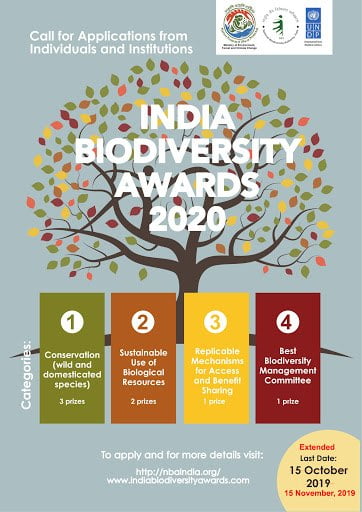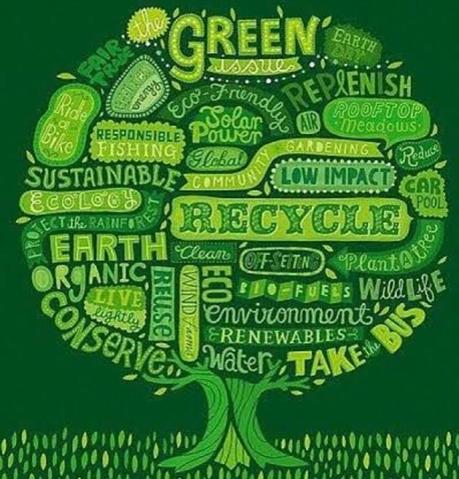The young author of the book ‘5 Feet 5 Inch Run Machine – Sachin Tendulkar’, Amit Kalantri wrote, “Finish the work; otherwise an unfinished work will finish you.” In an analogous way, the world is beset with the unfinished work towards environment and it raises a spectred question on our future. If Nature is the art of God, we all are portraitists with canvases of our own: the government and the citizen alike. To sing in harmony, we have to be synchronous in our responsibilities.
The future approach to the triad aspects of preservation, conservation and protection of the environment cannot be easily wished away only to the government of the day. Instead, we should bring in a two-pronged strategy of government-citizen participatory model; wherein besides the institutional initiatives, the common man too is empowered to pro-actively contribute in the ‘not enough’ attitude to our environment today.
The various institutional initiatives taken by the Indian government was enumerated in the Part 2 of this series on World Environment. However, there still remain many grey areas and steps that need to be undertaken and expedited to meet the needs of Nature and environment in all its diversity. Some of these steps are:
- Air Quality

A portion of the world’s most polluted urban communities are in India. The natives of Delhi and elsewhere are, as of now, experiencing the insufferable effect of poor air quality. Some urgent steps to implement are:
- Move from petroleum/diesel to electric vehicles.
- Replace existing cook stoves with clean cook stoves.
- Restrict open burning of biomass and fossil fuels.
- Change to liquid petroleum gas (CNG) and electricity, along with biogas and ethanol as some of the clean energy alternatives.
- Implement the Continuous Emission Monitoring System (CEMS) framework aiming towards efficient enterprises.
- Water Conservation

A NITI Aayog report alarmingly expresses that 21 Indian urban communities, including Delhi, Bengaluru and Hyderabad are probably going to run out of groundwater by 2020. The government should firmly adopt:
- The policies, strategies and activities made to manage water as a sustainable resource, to protect the water environment, and to meet current and future human demand.
- All enterprises must be made Zero Liquid Discharge (ZLD) units.
- Adopt large-scale and modern Drip Irrigation Systems (DIS).
- Prevent the untreated effluents from entering our water bodies.
- Formulate laws towards equi-distribution of water at the national and local levels.
- Implement the National River Linking Project (NRLP) at the earliest.
- Waste Management

India produces more than 1.50 lakh metric tonne (MT) of solid waste every day, of which 90 per cent is collected waste. Waste pickers make a significant contribution to this collection. There remains a significant scope for better collection, recycling and disposal of waste. Some of the immediate concerns are:
- Rapidly manufacture industrial equipment for disposal of the ever-increasing electronic, plastic, biomedical and other hazardous wastes, especially through the ‘Made in India’ banner.
- Rapidly implement cleanliness of the cities through the ‘Smart City’ and ‘Cleanest City’ initiatives.
- Implement a national-level single-use plastic mechanism and fund recycling research.
- Greater research on the alternative uses of recyclable and disposable material.
- Find ways and means to rehabilitate and recognize waste pickers, as an essential service.
- Mechanise waste collection.
- Wildlife and Biodiversity

The Biological Diversity Act, 2002, was aimed at preservation of biological diversity in India, with mechanism for the equitable sharing of benefits arising out of the use of traditional biological resources and knowledge. However, many of its objectives remain unfulfilled. Some of the immediate concerns are:
- Bring in transparency in the inter-state relationships and cross flow of information.
- Bring in methods/laws to better regulate National Parks, Sanctuaries, Conservation Reserves and Community Reserves all over the country covering the important habitats going by the provisions of the Wild Life (Protection) Act, 1972, to provide better protection to wildlife, including threatened species and their habitat.
- Strict action against the poachers, timber mafia through local people’s involvement, including ethnic tribes.
- Increase biodiversity vigilante groups and empower them.
- Develop a national environment intelligence team to monitor the exploiters of flora and fauna. Cases like the international wildlife trader, Sansar Chand, must be rooted out.
- Increase awareness amongst the citizens on care of the wildlife and forests. The recent heart-wrenching case from Kerala wherein a pregnant elephant died due to miscreants feeding it with explosive-laden pineapples is a moot point not to be repeated.
What can us as Citizens Do?
Distinguished environmentalist Vandana Shiva, in an article in The Times of India on June 6, 2020, says, “We are literally consuming the Earth and our future. We have separated ourselves from the well-being of our planet, fragmented Earth into parts, each to be mined as material for industrial processing, creating only ever-growing waste and pollution.”
Due to the change in our lifestyles and our ever-increasing crave for consumption, a faulty developmental model and the self-centered existence at the citizens level; has only deteriorated the condition of the environment. The cause of the emerging scourge of diseases like SARS, MERS, Zika, Ebola and the latest pandemic COVID-19 are attributable to the failing relationship between man and Nature. We humans have alarmingly assumed ourselves to be a superior species, separate from other beings and have forgotten our little share of return to Nature what Nature gave us. The wise philosopher Socrates said, “He is richest who is content with the least, for content is the wealth of Nature.”
On this World Environment Day 2020, let us look at some of the ways in which we as citizens can contribute towards protecting the environment.

- Ceaseless Consuming: We should reduce our greed and wean ourselves away from the consumerist culture that is dominating our lives; be it in clothes, in food, in energy, in the natural resources like water and the like. Let us keep as much as our body and needs need and not take to a ‘throw-away and waste-away culture’.
- Protecting the forests and wildlife: The Angami tribe of Nagaland gave up their ancient tradition of hunting to protect wildlife to create a more stable ecosystem for future generations. The Dongria Kondhs in Odisha fought to protect their sacred Niyamgiri Hills from mining. The religious belief of the Bishnois in Rajasthan to possessively protect, nurture and grow the flora and fauna of their place is indeed a unique example in the world. These examples should inspire us to follow suit as responsible citizens.
- Planting more trees: Let us emulate the Gond tribes of Maharashtra, who worship and protect the trees with a vengeance. Or better still; follow the footsteps of Jadav Payeng, known as the Forest Man of India, who spent 30 years of his life planting trees to save his island. Let us imbibe the culture of ‘one man one tree’.
- Garbage Cleaning: Let us take the extraordinary example of Afroz Shah, a 33 year-old lawyer-turned-environmentalist of Mumbai, who is known across the world as the man who kick-started world’s biggest garbage clean-up project at Versova beach near Mumbai. He nearly single-handedly cleared more than 20 million kilos of garbage in over 160 weeks. His dedication and perseverance teaches us to shun litter and take stock of garbage.
- Reduce energy consumption: Practicing these good habits will not just reduce electricity consumption, but also save money and distribute the energy: unplug appliances when not using them, make sure your appliances are energy efficient, install LED lights, seal-up any gaps in the windows and doors to retain cooling, turn down your thermostat of the water heater, insulate your home better and reduce water consumption.
- Adopt public transport: As we all know more and more cars on the roads add up to pollution, it is in our own interest to adopt the use of public transport and shun private vehicles for commuting, as much as possible. Disbelief in the belief that owning a car is a status symbol. Car-pooling is another option.
- Rainwater Harvesting: The careless use of precious resources like water has created a huge water crisis in India. We should start saving the water and make arrangements in our houses for rainwater harvesting.
To conclude, the environment encompassing Nature and Biodiversity, its upkeep and nurture, should form the sum-total of our very first reason of existence as a superior species. God has ordained us with a belief to be the reflection of his image in our limited stay on Earth. If we believe to join him, in our passage beyond, as is the desire of every human being, then we ought to leave behind a legacy for without man there cannot be another man in making.Let us not forget that the Earth can live without us Humans and the reverse is a never mentioned falsehood.
(This is the third and concluding part of our series on World Environment Day)
Also read: Earth Day Musings Amid COVID Lockdown
Also read: World Environment Day: India’s Concern & Contribution
Also read: World Environment At Crossroads



